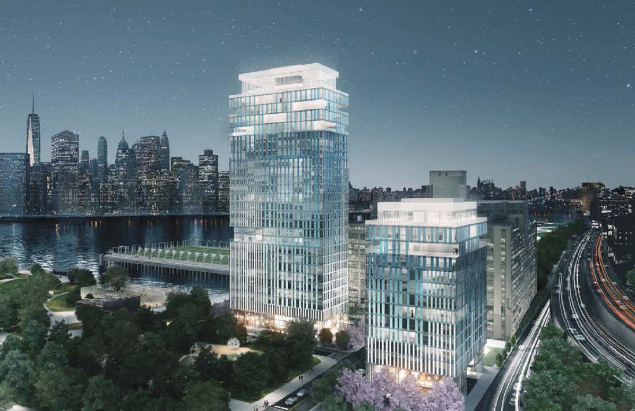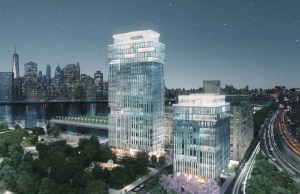Brooklyn Bridge Park Debate Over Space, Funding Continues
By Jennifer Henderson August 7, 2014 6:09 pm
reprints

Brooklyn residents turned out in force at Borough Hall yesterday where the Brooklyn Bridge Park Corporation addressed community members’ call for review of current residential development plans near Pier 6 at the bi-monthly board meeting.
Politicians, citizens and community activists debated whether the Brooklyn Bridge Park Corporation, which is responsible for the planning, construction and operation of Brooklyn Bridge Park, should further review submitted proposals for the two planned residential buildings, particularly for space and environmental concerns. The call for open space was met with applause, while requests for compromise regarding the park’s funding were met with angry shouts.
“We should maximize every bit of open space for people who use the park,” said Doug Biviano, a neighborhood Democratic candidate for New York State Assembly. He added that there is already overcrowding and a lack of grassy areas for families to enjoy at the park.
In 2002, Brooklyn Bridge Park along the East River received $160 million from the city and state for development. The self-sustaining aspect of the park was essential in an agreement with public entities, with private development of previous residential developments having funding upkeep ever since. The most recent plan calls for an additional 31-story residential building, along with one that is 15 stories.
Controversy surrounding further residential development at the 85-acre B has been stirring since city officials modified a set of 2006 plans to include affordable housing, as reported by the New York Times.
The de Blasio administration has required an increase in affordable housing at the Pier 6 development. Earlier this month, Brooklyn residents filed a lawsuit to stop the planned residential development. A day before the hearing the Wall Street Journal reported the city had received 14 design proposals from potential developers for the two planned residential towers at the park.
Following a series of short speeches from local residents expressing concern over the loss of open space that they say will occur from high-rise development, Brooklyn Bridge Park board member Michael Crane spoke of the need for compromise, and was not warmly received.
“We seem to have forgotten that the fact… the city and the state actually came together to fund the creation of the Brooklyn Bridge Park in the first place was and remains a wonderful thing,” Mr. Crane said. “However, both entities made it clear from the beginning that a new park would have to be self-sustaining.” He added that the “limited residential development” will allow for a “beautiful five-acre park that we otherwise would not have.”
In response, the crowd shouted: “Does it have to be 31 stories?”
Locals in attendance remarked they were unaware of the size of the planned structures, and requested further evaluations and changes be made.
Ultimately, the Brooklyn Bridge Park Corporation board voted 10 to 3 against an assessment of the current plan.
“We do not recommend the re-opening of the general project plan for the park, but are committed to an environmental review for the site,” said Regina Myer, president of the Brooklyn Bridge Park Corporation.
The pending lawsuit will delay a final decision on the plan.



